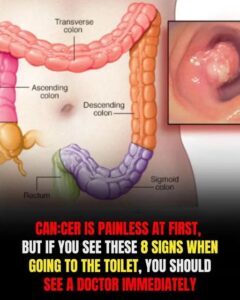
Can:cer often develops quietly, especially in its early stages, when it can be painless and hard to detect. One commonly overlooked warning sign lies in unexpected changes in your bathroom habits.
If you notice any of these eight unusual signs when using the toilet, they could be early indicators of a serious condition, including can:cer. Spotting these signs early can be life-saving.
1. Blood in Stool or Urine
Seeing blood where it doesn’t belong is a serious warning, potentially signaling can:cers such as colorectal, kidney, or bladder can:cer.
Watch for:
- Bright red or very dark stool (a sign of internal bleeding).
- Pink, red, or tea-colored urine without an apparent cause.
- Blood that comes and goes but never fully disappears.
Why it’s important:
Even a one-time occurrence should be reported to a doctor immediately.
2. Ongoing Diarrhea or Constipation
Changes in your regular bowel routine that persist for weeks may point to colorectal can:cer.
Watch for:
- Diarrhea that doesn’t improve despite dietary adjustments.
- Long-term constipation or difficulty with bowel movements.
- Constant feeling that your bowels aren’t fully emptied.
Why it’s important:
A tumor may interfere with bowel function, altering your habits.

3. Sudden, Unexplained Weight Loss
Losing weight unexpectedly and without trying is often a sign of can:cer in the digestive system.
Watch for:
- Dropping more than 10 pounds without changes to your routine.
- Feeling full quickly or losing your appetite.
- Noticeable loss of strength or muscle tone.
Why it’s important:
Can:cer can speed up metabolism and suppress appetite, leading to rapid weight loss.
4. Abdominal Discomfort and Bloating
Frequent, unexplained stomach pain or bloating could indicate can:cer in the stomach, ovaries, or pancreas.
Watch for:
- Bloating that doesn’t go away over time.
- Unusual cramps or pain in the abdomen.
- Discomfort after eating that lingers.
Why it’s important:
Ongoing bloating or abdominal pain that persists for weeks should be evaluated by a doctor.
5. Urinary Changes
Shifts in your urinary routine may point to prostate, bladder, or kidney can:cer.
Watch for:
- Needing to urinate often, especially overnight.
- Difficulty starting or maintaining urine flow.
- Burning or pain while urinating.
Why it’s important:
Persistent urinary issues can be early signs of urological can:cers.

6. Narrow or Ribbon-Like Stools
A noticeable change in the shape of your stool may indicate a partial obstruction in the colon caused by a tumor.
Watch for:
- Stools that become consistently thinner than usual.
- Discomfort or the sensation of blockage during bowel movements.
- Unusual stool shape lasting longer than two weeks.
Why it’s important:
Consistently narrow stools may be a sign of colorectal can:cer.
7. Extreme Fatigue
Feeling unusually tired all the time, even with adequate rest, could be a red flag.
Watch for:
- Constant exhaustion without exertion.
- Weakness, dizziness, or breathlessness.
- An ongoing need to nap or rest throughout the day.
Why it’s important:
Can:cer can sap your energy and interfere with red blood cell production, leading to fatigue.
8. Lasting Stomach or Lower Back Pain
Ongoing pain in the abdominal or lower back area that doesn’t improve with rest may be linked to kidney, ovarian, or pancreatic can:cers.
Watch for:
- Dull or sharp pain that spreads from the stomach to the back.
- Pain that intensifies over time.
- No identifiable cause for the discomfort.
Why it’s important:
Pain that sticks around could be your body signaling something more serious.

When Should You See a Doctor?
If any of these symptoms last longer than two weeks, it’s time to consult a healthcare professional. Early detection of can:cer significantly improves treatment outcomes.
Final Thoughts
Can:cer doesn’t always start with obvious pain. That’s why it’s crucial to pay attention to subtle changes, especially those related to digestion or urination. Don’t dismiss ongoing symptoms. Getting screened early could be the key to protecting your health—and your life.